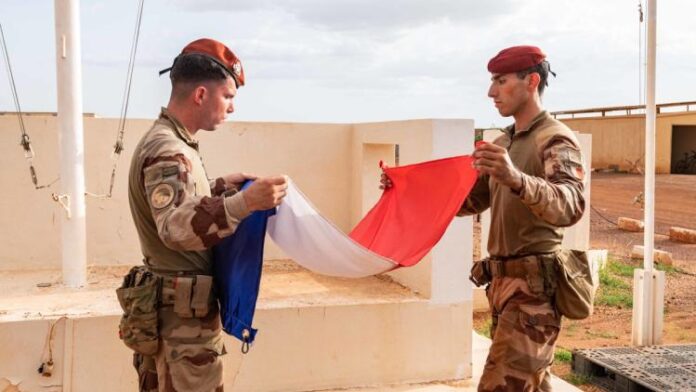A Ceremony that Buries Six Decades of Military Presence
On July 16, 2025, in Dakar, a solemn yet inevitable scene unfolded: the official end of the French army’s permanent presence in Senegal. After sixty-five years of post-colonial entrenchment under the guise of military cooperation, the last French installations—namely Camp Geille in Ouakam and the military air stopover at the airport, were formally handed back. A historical page turns, but more so, an entire chapter of veiled strategic control finally cracks.
The Programmed Erosion of an Exhausted Military Influence
Since 2022, the dominoes have fallen one by one: Mali, Burkina Faso, Niger, Chad, Gabon. The French army has been forced to reduce its footprint in the face of a growing wave of popular and political rejection, dismissed in Paris as a “temporary rupture.” In truth, it is a seismic shift: the peoples of West Africa are demanding full sovereignty, free from the shadow of foreign military sponsorship that is now perceived as illegitimate, if not outright toxic. The French withdrawal from Senegal, initiated in March, marks the final act in a strategic play that has lost its purpose.
The End of the EFS: A Symbol, Not Just a Logistical Retrenchment
With the dissolution of the French Elements in Senegal (EFS), some 350 French troops pack their bags. Meant to embody a partnership of equals, the EFS in reality symbolized asymmetry: lopsided relations, murky objectives, and the ever-convenient rhetoric of the “anti-terror fight.” This week’s ceremony, overseen by General Pascal Ianni on the French side and General Mbaye Cissé on the Senegalese side, officially closes a chapter that Paris frames as “constructive transition”—but which is, unmistakably, a strategic admission of failure.
Bassirou Diomaye Faye: Sovereignty Rhetoric or Realist Posture?
Senegalese President Bassirou Diomaye Faye, elected on a promise to break with neo-colonial patterns, made his intentions clear in November 2024: all foreign military presence would end in 2025. This declaration, couched in the language of national dignity, sends a message to neighboring states—military bases imposed from abroad are a relic of a bygone era. Despite his diplomatic tone, “renewed partnership”, the implications are unambiguous: the old order is gone. France must now engage not as a patron, but as an occasional partner.
French Strategy Adrift
Officially, France describes the withdrawal as “coordinated.” But the broader context is telling: sidelined in the Sahel, rejected by popular movements, diplomatically impotent in the face of new authoritarian regimes that nonetheless enjoy local legitimacy. The French army exits Senegal having left no lasting operational legacy, only the imprint of a waning influence. Only Djibouti remains, an eastern military enclave now presented as a “projection point” for future African missions. But the language is vague, almost defensive.
French Army in Senegal: A Heavy Legacy
Since Senegal’s independence in 1960, France’s military presence has been uninterrupted. Whether labeled the French Forces of Cape Verde (FFCV) or the French Elements in Senegal (EFS), the structure served less as a training asset and more as a discreet tool of influence. Bilateral defense agreements and formal cooperation never masked the asymmetric nature of the relationship, tilted overwhelmingly in favor of French command.
By 2012, combat units had withdrawn, but the military spine remained. This withdrawal, long-prepared yet symbolically brutal, marks the close of an era.



